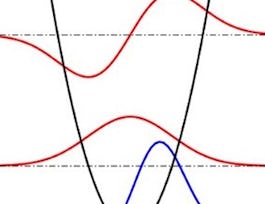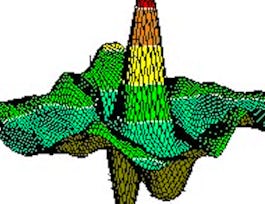Begin your journey by exploring the mathematical foundations that are crucial to understanding quantum mechanics. From probability theory and complex numbers to matrices and linear transformations, this course builds a strong framework, ensuring that each concept is connected to real-world applications in quantum computing. This section helps you distinguish between classical and quantum systems, emphasizing their operational differences.



Mathematical Foundations and Quantum Mechanics Essentials
This course is part of The Complete Quantum Computing Course for Beginners Specialization

Instructor: Packt - Course Instructors
Sponsored by Coursera for Reliance Family
Recommended experience
What you'll learn
Recognize key distinctions between classical and quantum computing.
Understand key mathematical concepts such as matrices, probability, and complex numbers in quantum mechanics.
Solve matrix operations and perform linear transformations, analyzing quantum states using superposition and entanglement.
Develop a framework for multi-qubit systems, evaluating Braket notation for representing quantum states and its applications.
Details to know

Add to your LinkedIn profile
1 assignment
October 2024
See how employees at top companies are mastering in-demand skills

Build your subject-matter expertise
- Learn new concepts from industry experts
- Gain a foundational understanding of a subject or tool
- Develop job-relevant skills with hands-on projects
- Earn a shareable career certificate


Earn a career certificate
Add this credential to your LinkedIn profile, resume, or CV
Share it on social media and in your performance review

There are 3 modules in this course
In this module, we will introduce the course and provide a roadmap to help you navigate through the learning journey. You will also gain insight into how to maximize the course's resources and understand the foundational concepts that will be covered in upcoming modules.
What's included
2 videos2 readings
In this module, we will explore the mathematical principles that form the backbone of quantum mechanics. From fundamental concepts such as probability and statistics to more advanced topics like matrix operations and linear transformations, this section builds the necessary mathematical foundation for understanding quantum systems.
What's included
9 videos
In this module, we will dive deep into the physics of qubits, focusing on key quantum phenomena such as superposition, interference, and entanglement. You will also learn about Qubit states and how multi-qubit systems function, along with the Braket notation essential for understanding quantum states.
What's included
6 videos1 reading1 assignment
Instructor

Offered by
Why people choose Coursera for their career




Recommended if you're interested in Computer Science

University of Colorado Boulder

Fractal Analytics

University of Colorado Boulder

Open new doors with Coursera Plus
Unlimited access to 10,000+ world-class courses, hands-on projects, and job-ready certificate programs - all included in your subscription
Advance your career with an online degree
Earn a degree from world-class universities - 100% online
Join over 3,400 global companies that choose Coursera for Business
Upskill your employees to excel in the digital economy



